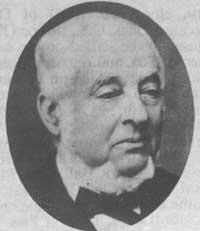Astronomer Warren de la Rue
Elhuyar Fundazioa
This British astronomer was born in 1815 in Guernsey (Channel Islands, in the French Cherbourg islands) on January 15 and died in London on April 19, 1889. This same month marks the centenary, an excuse that we consider interesting to report some details of his life and his contributions to astronomy.
After completing his studies at the Sainte-Barbe school in Paris, Warren De la Rue joined his father's printer, where in 1851 he invented the first envelope making machine.
From 1852 he directed all his forces to astronomical photography. He was one of the first to photograph the Moon, but because the photos he made were very precise, he had the possibility to amplify them twenty times. In this way, the Moon could be better seen than permanently and often seen with a telescope.

In 1858 he invented the photoheliograph in Kew (south of London). It was a special design telescope, prepared to photograph the sun during the day. It combined two photographs taken after baptism and in 1862 stereoscopic photographs of the Moon and the Sun were very successful at the International Exhibition in London.
In 1860 he showed that the red jets that came out of the Moon's disk by the excursion to Spain to see a total eclipse of the Sun were of the Sun (and not of the Moon).
Together with Schwabe's statements about sunspots made two decades earlier, it can be said that the discovery of De la Rue began astrophysics. This branch of Physics began studying the Sun and later began to investigate other stars through the Secchi spectroscope.
De la Rue was also concerned about chemistry and electricity, especially the platinum filaments of the electric lamp and the electric discharges of gases. As a result of the trials carried out with the batteries, he invented silver chloride cells.
He was elected a member of the Royal Society of London in 1850 and in 1864 he received the Medal of Kings. It was also part of the Royal Astronomical Society since 1862. Also from the French Academy of Sciences. Among his publications is Researches on Solar Physics.





